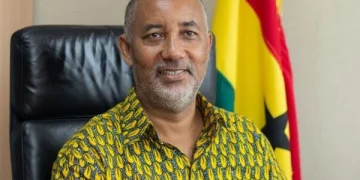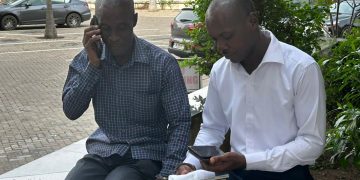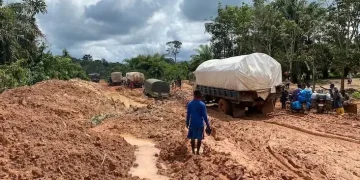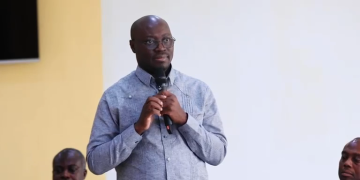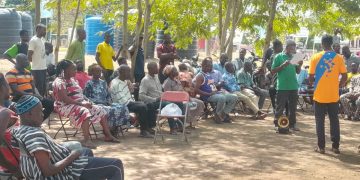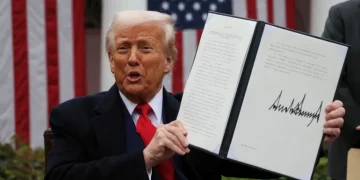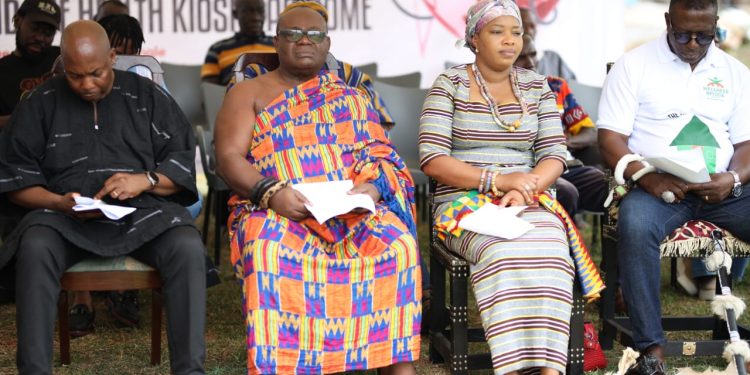On a Saturday morning in Adidome in the Central Tongu District of the Volta Region, the town square came alive. Market women left their stalls, okada riders parked their bikes, and curious children gathered under a large canopy. They watched as health workers gently wrapped blood pressure cuffs around arms, pricked fingers for sugar tests, and explained results in simple terms.
For many in the crowd, this was the first time they had ever been screened for hypertension or diabetes. Yet, what unfolded that morning was not just a one-day event. It marked the beginning of something bigger: the launch of a Health Kiosk initiative, a project designed to bring preventive healthcare directly to ordinary people.
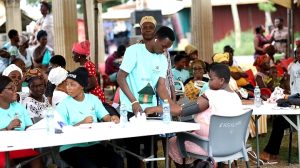 Commissioner and Volta Region Representative to the National Development Planning Commission (NDPC), Dr. Elikplim Kwabla Apetorgbor, who chaired the launch, saw in the kiosk a spark of transformation.
Commissioner and Volta Region Representative to the National Development Planning Commission (NDPC), Dr. Elikplim Kwabla Apetorgbor, who chaired the launch, saw in the kiosk a spark of transformation.
“Health and development are inseparable. A healthy people form the bedrock of a productive economy. By ensuring early detection of hypertension, diabetes and other silent conditions, this initiative places the well-being of the community at the centre of our development efforts,” he said, his words drawing nods from chiefs, queenmothers and residents present.
Describing the Health Kiosk as “a true example of visionary leadership,” Dr. Apetorgbor commended Togbe Kwasinyi Kakaklolo Agyeman V, Chief of Adidome and Executive Director of Wellness Bridge Initiative (WBI), for daring to act on a health crisis that often goes unnoticed until it is too late.
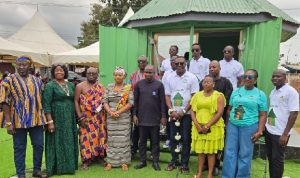 He said the project was not only timely but also aligned well with President John Dramani Mahama’s people-centered health policy, which emphasises community-based care, prevention, and early detection.
He said the project was not only timely but also aligned well with President John Dramani Mahama’s people-centered health policy, which emphasises community-based care, prevention, and early detection.
Appealing for support, the NDPC Commissioner urged philanthropists, development partners and other traditional leaders to back similar interventions. “Let us light these small fires in our communities – for when each of our stools rises in unity and purpose, the whole region shall glow with development,” he said.
The Health Kiosk is designed to serve ordinary people, from hawkers and okada riders to market traders and passersby. Screenings will cover blood pressure, blood sugar and body mass index, with attendants trained and supervised by the District Health Directorate. Patients at risk will be referred to the Adidome District Hospital for further care.
The project runs on WBI’s four pillars, known as ACNE. These are Awareness through health education campaigns, Checking to know your status through free screenings and referrals, Nutrition under the message “We are what we Eat,” and Physical Exercise through community fitness programs, especially for those aged 50 and above under the campaign “Age is a Number.”
For Togbe Kwasinyi Kakaklolo Agyeman V, the kiosk is a response to a silent but deadly crisis. He called it “a candle of hope” for his people.
“The Health Kiosk project is designed to offer preventive health solutions to the people, starting with Adidome and scaling up to all five sub-districts of the Central Tongu Health Directorate, and further extended to other parts of Ghana,” he said.
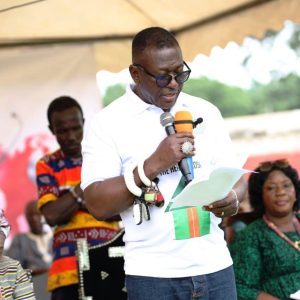 He pointed to data from Johns Hopkins Nursing which revealed that “Hypertension tops all adult hospital admissions and is associated with a significant proportion of overall adult deaths in hospitals in Ghana.” For him, the impact is visible at every funeral ground. “Funeral posters with those screaming inscriptions like ‘What a Shock’; ‘Gone too Soon’; ‘Painful Exit’, etc. etc. are becoming too common. Let us deal with it.”
He pointed to data from Johns Hopkins Nursing which revealed that “Hypertension tops all adult hospital admissions and is associated with a significant proportion of overall adult deaths in hospitals in Ghana.” For him, the impact is visible at every funeral ground. “Funeral posters with those screaming inscriptions like ‘What a Shock’; ‘Gone too Soon’; ‘Painful Exit’, etc. etc. are becoming too common. Let us deal with it.”
The launch was attended by dignitaries including the District Chief Executive of Central Tongu, Hon. Adison Dodzie Mornyuie, the District Director of Health Service, Mr. Baba Awuni, chiefs and queenmothers such as Mama Drapey of Adidome, as well as media, leaders and community members. A free health screening exercise gave residents a taste of what the kiosk will provide regularly.
Togbe Agyeman expressed gratitude to the Central Tongu District Directorate of the Ghana Health Service (GHS), the Mafi Adidome Development Advisory Board (MADAB) and individual donors for making the first kiosk possible. He appealed for wider support from government, international donors, corporate institutions and philanthropists.
“This project provides a solution to the UN SDG 3. We have the vision, we have the plan. What we now seek is the fuel to expand, operate sustainably, and reach every corner of Ghana and beyond,” he said.
Source: www.KumasiMail.Com/JosephZiem



